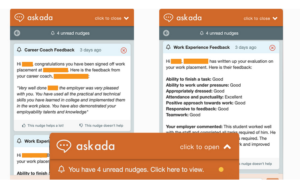Subscriptions to streaming learning provision
 Soon after MOOCs had burst onto the scene, I was talking to a senior manager at a UK university. He was charged with leading their development of MOOCs. But despite his enthusiasm,he thought he would only be given two or three years to get things right. And the big thing he had to get right was making money.
Soon after MOOCs had burst onto the scene, I was talking to a senior manager at a UK university. He was charged with leading their development of MOOCs. But despite his enthusiasm,he thought he would only be given two or three years to get things right. And the big thing he had to get right was making money.
And so it has been for the last ten years. There have been a whole number of attempts to make money out of MOOCs. One popular measure has been to charge for certification. The problem with that is that many who enroll on a MOOC really are not that concerned about the certificate. And others may wonder just how much traction a MOOC certificate has on the labour market, even if from a renowned university or university alliance. Another way of raising funds is to allow access to a MOOC for a period after it has finished for a fee. Of course the early MOOC providers generally just turned themselves into commercial online course providers, with a pivot towards continuing professional development,especially towards technical knowledge and skills.
Europe’s largest MOOC provider FutureLearn, an alliance of organisations led by the UK open University,has tried quite a few of these ideas. And now they are enhancing their paid for provision, albeit with an interesting spin.
“You’ve probably heard of music, TV, fitness, and even snack subscriptions,” they say, “but what about a subscription to learning?”
Whilst the world was already well on its way to being filled with subscription-loving societies, the COVID-19 pandemic has supercharged our desire for easy, affordable access to the things we love without setting foot outside the front door.
Our way of achieving this at FutureLearn is by offering flexible, career-focused, and fun learning experiences online.
Our brand-new learning subscription model,, offers you the chance to build expert knowledge and workplace skills entirely on your own terms.
In an explanation of Learning Subscriptions which they, describe as “the learning of 2020, they say:
Learning on demand refers to the kind of learning where you have access to educational content at any time or in any place. The learner, therefore, has control over their learning and gets to plan and create their own educational journey. A model like this differs from a typical in-person learning model due to its flexibility and because it requires less of a financial and personal commitment.
So is this really something new and does it require less commitment?
ExpertTracks -the FutureLearn implementation of Learning Subscriptions
are carefully curated series of online courses that focus on specific areas of learning. They’re designed to help you fast-track your studies across various topics, subject areas, and industries.
You’ll find ExpertTracks on a diverse range of topics, including ones such as blended learning, getting started with SEO, and fintech innovations. From the basics of psychology to the teaching of practical science, you can develop your skills to match your career aspirations. …..
with each ExpertTrack, you’ll complete at least 20 hours of learning time, often from a top educational or business institution.
The ExpertTracks look to me like a series of repackaged MOOCs, designed for continuing professional development. But of course one of the things about MOOCs is they were free and have played a big role in opening up education. The cost per month per ExpertTrack is 36 British pounds.
I am sure many of these online courses (because that is what they are) will be very good. But all in all I can’t help thinking this is yet another go at marketising MOOCs. And I am not sure that people are going to ought up 36 pounds a month to Open Learn for professional development which if we are serious about promoting and supporting skills development should be for free.







 The International Labour Organization (ILO) have launched a E-Discussion on Continuing online learning and skills development in times of the COVID-19 crisis. The discussion started on 27 March and runs to 9 April.
The International Labour Organization (ILO) have launched a E-Discussion on Continuing online learning and skills development in times of the COVID-19 crisis. The discussion started on 27 March and runs to 9 April. Regular readers will know I am working on a project on AI and Vocational Education and Training (VET). We are looking both at the impact of AI and automation on work and occupations and the use of AI for teaching and learning. Later in the year we will be organizing a MOOC around this: at the moment we are undertaking interviews with teachers, trainers , managers and developers (among others) in Italy, Greece, Lithuania, Germany and the UK.
Regular readers will know I am working on a project on AI and Vocational Education and Training (VET). We are looking both at the impact of AI and automation on work and occupations and the use of AI for teaching and learning. Later in the year we will be organizing a MOOC around this: at the moment we are undertaking interviews with teachers, trainers , managers and developers (among others) in Italy, Greece, Lithuania, Germany and the UK.